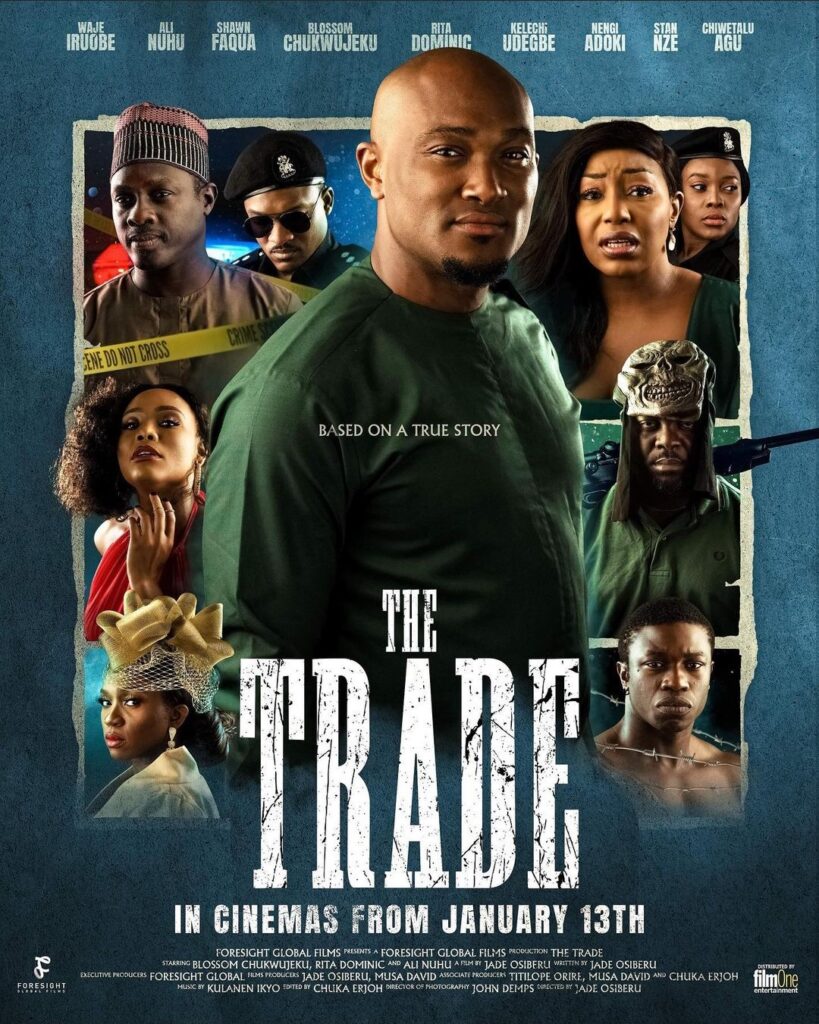In this list, we look at ten trailblazing African films that debuted on streaming services this year, with a focus on the breakthroughs and exploits of these productions.
By Joseph Jonathan and Seyi Lasisi
2023 was suffused with several anticipated incredible movies from Africa. Productions from the continent were constantly in the spotlight, courting the attention of international film festivals such as Berlinale, Sundance, and international documentary film festivals, with the filmmakers behind the cinematic gems winning covetable awards. Culture-defining African films such as the Milisuthando Bongela-directed documentary, Milisuthando, C.J. “Fiery” Obasi’s Mami Wata, the Moroccan The Mother of All Lies, directed and written by Asmae ElMoudir, and Apoline Traoré’s Sira, toured international film circuits.
In the last 12 months, too, Africa’s cinematic landscape – through huge investments in the industry – was filled with different showcasing on streaming platforms such as Netflix, Prime Video, and Showmax. While these films ranged from shallow to mildly enjoyable, commendable, and entertaining, these films were able to achieve cinematic feats which we watched unfold on our screens. Filmmakers were ambitious, and with their undertakings, created productions that were first of their kind or deviated from convention, whether with the ways they approached their stories, their budgets, or the chart-topping numbers their productions have garnered.
In this list, we look at ten trailblazing African films that debuted on streaming services this year, with a focus on the breakthroughs and exploits of these productions.
An Instant Dad
Kenyan filmmaker, Jennifer Gatero, makes her return with her second film on Netflix, An Instant Dad, following the success of her directorial debut feature, the gritty crime-thriller, Nairobby which was acquired by the streaming platform in 2022. The Kenyan drama film follows Rikki (Blessing Lung’aho), a serial bachelor and chronic womaniser whose life takes a drastic turn when ten-year-old Amy (Hannah Wanjiku) turns up at his doorstep, claiming to be his daughter. Rikki must now navigate the complexities of his relationship with his daughter while tending to his fatherly responsibilities.

Gatero is consistently breaking boundaries as an independent filmmaker, and her second feature film is a testament to the fact that great things can happen from a small place.
An Instant Dad is currently streaming on Netflix.
Shaina
Shaina (which is an informal term for “glow” in Shona) is a film that shines with its moving story and believable acting performances. Being the second-only Zimbabwean film stream on Netflix since Cook Off (2017), the film represents a glowing future for Zimbabwe’s film industry.

If you love a good coming-of-age film with a touching story about faith and resilience, then Shaina is for you. The film tells the story of a teenage girl named Shaina (Wilmah Munemera), who, growing up under difficult circumstances in modern-day Zimbabwe, must utilise her talents to survive the dangers of her society.
You can watch Shaina on Netflix.
The Queenstown Kings
Everyone loves an underdog story, where a person goes from having almost no hope of survival to achieving success through grit, determination, and self-belief. This makes the South African sports drama, The Queenstown Kings, a film for everyone.

Directed by Jahmil X.T. Qubeka (Sew the Winter to My Skin and Knuckle City), the film follows Buyile (Zolisa Xaluva), a washed-up football star, who returns to rural Queenstown and struggles to connect with his son Fezile (Likhona Mgali), a promising player with big dreams. Through this film, Qubeka paints a picture that reflects a subconscious perspective on the human condition, offering South Africa’s only sports drama in recent memory.
The Queenstown Kings is streaming on Netflix.
(Read also – Icons of Nollywood: Celebrating The Stars Who Help Shape Nollywood Behind the Scenes)
The Black Book
There are many words to describe the Editi Effiong-directed film, but “global hit” stands out from the rest. The Nigerian crime thriller centres around Paul Edima (Richard Mofe-Damijo), an ex-hitman turned deacon, whose world shatters when his son, Damilola, (Olumide Oworu) is unjustly accused and slain by a corrupt police gang as a cover-up for a more sinister and insidious operation. Paul embarks on a convoluted quest to clear his son’s tarnished name and expose the corrupt system he helped build.

The Black Book is historic – a film of many firsts. In just one week after its release on Netflix, it became the first Nigerian and African film to claim the top spot on the global viewing charts with 11.2 million views. As Effiong’s directorial feature film debut, it was also the first Nigerian film to be made with a budget of 1 million dollars, majorly funded by Nigeria’s tech elite – the first Nigerian film born from a collaboration with tech investors.
The Black Book is available on Netflix.
The House of Secrets
Nigerian filmmaker, Niyi Akinmolayan has remained ambitious throughout his career and this ambitiousness is once again shown in The House of Secrets. The film follows efforts to retrieve a secret from the past of Sarah (Najite Dede) and how this secret might prevent the country from electing a president with a checkered past. In this film, Akinmolayan reiterates his desire to create expansive and captivating films.

Given the liberty to explore under Anthill, his home studio, Akinmolayan raises the bar with this film, as multiple scenes were shot in black and white, creating a unique aesthetic appeal. The production design further speaks to the ingenuity of the film as it perfectly captures both eras (the 1990s and present day) the film was set.
The House of Secrets is available on Prime Video.
Big Nunu’s Little Heist
For audiences familiar with the South African film industry, there is a difference in the Andy “Admiral” Kasrils-directed Big Nunu’s Little Heist, and the way it saturates your consciousness when you start watching the film. The film sets itself apart; it deviates from the overly sexualised and bloody crime thrillers which have over time become the conventional South African film identity. With its knack for comically passing a social commentary, the film is a worthwhile experience.

Big Nunu’s Little Heist revolves around the numerically named Thirty-Six (Jefferson Tshabalala), a delivery man, and Big Nunu (Tony Miyambo), the leader of an ill-fitted gang planning a heist. Behind the film’s comedy lurks an omnipresent political undertone. The unemployment crisis, constant robberies, the economic decline, and the abandoned factory that once employed Sgodiphola’s residents, are occasionally mentioned. Without being overt with social commentary and political treatise, the film gives voice to economic issues.
Big Nunu’s Little Heist is available on Netflix.
(Read also: 12 African Series You May Have Missed In 2023)
Republic of South Ah Sh**t
The Republic of South Ah Sh**t’s attractive aspect is how the film subliminally subverts its political tone to accommodate comedy. Directed by Kagiso Lediga, who easily rotates from being a comedian, writer, actor, director, and producer, the film testifies to his auteur identity.

This satirical film parodies and stereotypically presents the South African reality, telling a uniquely African political story. Republic of South Ah Sh**t captures – to the audiences’ glee and scrutiny – South Africa’s political, historical, financial, and religious problems. The film departs from the norm with its indie and artsy disposition and has secured a position as one of the country’s notable films.
Republic of South Ah Sh**t is currently streaming on Netflix.
The Trade
Jade Osiberu’s feature is inspired by the true story of a notorious kidnapper who tormented Nigerians in Southern Nigeria and the police officers desperate to catch him for about a decade. The Trade is led by the remarkable Blossom Chukwujekwu, who brings a nuanced interpretation to his role as the kidnapper.

The Trade captures the intriguing and thrilling take on organised kidnapping in Nigeria. The film sets itself as a believable Nigerian crime thriller, avoiding sensationalism or exaggeration. It is an ambitious film packed with action sequences and thriller tropes. Its attention to handling the details of the thriller tropes while driving a very Nigerian story is beautiful to witness.
The Trade is available on Prime Video.
Jagun Jagun
In what appears to be the first character-defining scenes in Jagun Jagun, Jigan (Odunlade Adekola) holds King Oniketo (Muyiwa Ademola) captive in the latter’s palace. After Jigan has committed enough sacrilegious acts, Ogundiji (Femi Adebayo) — the film’s self-defined villain, and saviour of intimidated kings – appears. Although jarring at different points, the film uses African mythology and history to push its plot forward, whilst attracting local and global audiences.

Jagun Jagun is available on Netflix.
Gangs of Lagos
Jade Osiberu’s Gangs of Lagos will forever be remembered in Nollywood history as Prime Video’s debut African original movie. This feat aside, there is a sense of political prophecy inherent in the crime thriller. Gangs of Lagos is set in a pre-gubernatorial election period and places fictional politicians and street lords in the film, with which Osiberu subtly brings a question to the fore: who are the umpires in an election, the voters, dominant street lords, or the cash-on-hand politicians? Who decides who rules us?

Nigerian writer, Teju Cole is often quoted to have written these sentences: “Writing as writing. Writing as rioting. Writing as righting. On the best days, all three.” By treading the sensitive issue of pre-election manipulation, the violent killing of innocent youths and gang fights, the storyline, co-written by Jegede and Osiberu attests to Cole’s words.
Gangs of Lagos is available on Prime Video.
Seyi Lasisi is a Nigerian student with an obsessive interest in Nigerian and African films as an art form. His film criticism aspires to engage the subtle and obvious politics, sentiments, and opinions of the filmmaker to see how they align with reality. He tweets @SeyiVortex. Email: seyi.lasisi@afrocritik.com.
Joseph Jonathan is a historian who seeks to understand how film shapes our cultural identity as a people. He believes that history is more about the future than the past. When he’s not writing about film, you can catch him listening to music or discussing politics. He tweets @JosieJp3.




